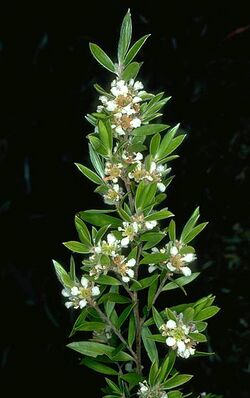Biology:Leptospermum whitei
| Leptospermum whitei | |
|---|---|

| |
| In the Australian National Botanic Gardens | |
| Scientific classification | |
| Kingdom: | Plantae |
| Clade: | Tracheophytes |
| Clade: | Angiosperms |
| Clade: | Eudicots |
| Clade: | Rosids |
| Order: | Myrtales |
| Family: | Myrtaceae |
| Genus: | Leptospermum |
| Species: | L. whitei
|
| Binomial name | |
| Leptospermum whitei Cheel[1]
| |
| Synonyms[1] | |
| |
Leptospermum whitei is a species of shrub that is endemic to eastern Australia. It has fibrous, flaky bark, elliptical leaves, white flowers arranged in small groups on the ends of short side branches, and fruit that falls from the plant when mature.
Description
Leptospermum whitei is a shrub that typically grows to a height of 3 m (9.8 ft) or more with reddish brown, fibrous or flaky bark, the younger stems covered with soft hairs. The leaves are elliptical, up to 25 mm (0.98 in) long and 3–4 mm (0.12–0.16 in) wide with a blunt point and tapering to a very short petiole. The flowers are white with several together on short side shoots, each flower about 10 mm (0.39 in) wide. The floral cup is densely covered with short, silky hairs, and about 2–3 mm (0.079–0.118 in) long. The sepals are hairy, oblong to hemispherical, about 1.5 mm (0.059 in) long, the petals 3–5 mm (0.12–0.20 in) long and the stamens about 1.5 mm (0.059 in) long. Flowering mainly occurs from October to January and the fruit is a capsule about 3–4 mm (0.12–0.16 in) with the remains of the sepals attached, but which fall from the plant when mature.[2][3]
Taxonomy and naming
This tea-tree was formally described in 1920 by Cyril Tenison White and William D. Francis who gave it the name Agonis elliptica and published the description in the Botany Bulletin of the Department of Agriculture, Queensland from specimens collected by Francis near Beerwah.[4] In 1932, Edwin Cheel transferred the species to the genus ''Leptospermum, but since there was already a species L. ellipticum (now known as Pericalymma ellipticum), Cheel changed the name to L. whitei, honouring C.T.White.[5][6]
Distribution and habitat
Leptospermum whitei grows in swampy, coastal heath between Wide Bay in Queensland and Coffs Harbour in New South Wales.[2][3]
References
- ↑ 1.0 1.1 "Leptospermum whitei". https://biodiversity.org.au/nsl/services/apc-format/display/101925. Retrieved 15 June 2020.
- ↑ 2.0 2.1 "Leptospermum whitei". Royal Botanic Garden Sydney. http://plantnet.rbgsyd.nsw.gov.au/cgi-bin/NSWfl.pl?page=nswfl&lvl=sp&name=Leptospermum~whitei. Retrieved 15 June 2020.
- ↑ 3.0 3.1 Thompson, Joy (1989). "A revision of the genus Leptospermum (Myrtaceae)". Telopea 3 (3): 356–357.
- ↑ "Agonis elliptica". APNI. https://id.biodiversity.org.au/instance/apni/492628. Retrieved 15 June 2020.
- ↑ Cheel, Edwin (1932). "Notes on the Pericalymmae section of the genus Leptospermum (with descriptions of three new species)". Journal and Proceedings of the Royal Society of New South Wales 65: 199. https://www.biodiversitylibrary.org/item/174267#page/247/mode/1up. Retrieved 15 June 2020.
- ↑ "Leptospermum whitei". APNI. https://id.biodiversity.org.au/instance/apni/529759. Retrieved 15 June 2020.
Wikidata ☰ Q15368408 entry
 |

